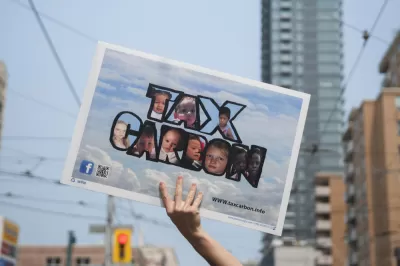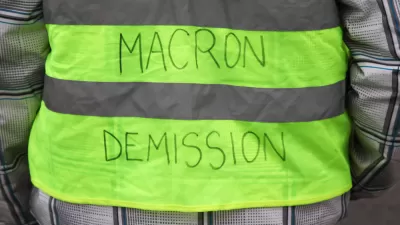Putting a price on carbon emissions is widely viewed as an effective tool to reduce emissions. It can also be applied to help those who stand to lose the most from climate change, thus enabling a socially just transition to a low carbon economy.

"Putting a price on carbon emissions can drive efficient emission reductions, spur innovation and allow businesses and households to choose how they reduce emissions," write Helen Mountford and Molly McGregor of the World Resources Institute (WRI), a global research organization. The article is largely based on research by Global Commission on the Economy and Climate in their 2018 report, The New Climate Economy.
Dealing with the disparate impacts of climate change on human population must become part of any climate action policy, the authors assert.
The effects of climate change will not be equitably distributed. Poor populations—those with the least capacity to adapt—will be hit the hardest by droughts, floods and other impacts. Women are particularly vulnerable to the impacts: For example, women and children are 14 times more likely to die during natural disasters than men.
Carbon policies, particularly those involving pricing, come with a risk to those who stand to suffer the most from climate change "if policies aren’t designed properly," add Mountford and McGregor.
The world saw this play out in France this month with the “Yellow Vests” protests. While the protests are clearly reflecting a wider anger over stagnant living standards and economic inequality, they were initially sparked in response to a rise in fuel taxes. The Yellow Vests protests, however, are not against climate action; rather, they are pro-equity, reflecting mounting dissatisfaction from rural and working-class citizens being left behind.
And this weekend, the protests continued, numbering 84,000 demonstrators on Jan. 12, up from 50,000 the previous week.
The good news is that the New Climate Economy’s 2018 Report describes how a low-carbon transition can, if managed well, deliver inclusive, sustainable growth. But, if poorly managed, there is real potential to exacerbate social exclusion, for example for workers and regions whose economies depend on coal mining.
Included among the strategies for investment of carbon pricing revenue is to "support the poor or other groups who are disproportionately affected by structural changes associated with the low-carbon transition," illustrating how carbon pricing "can be a powerful tool for supporting a just transition."
By contrast, most of the "Contribution Climat Énergie, a French version of the carbon tax," that was in the planned fuel tax hikes in France went toward deficit-reduction, with a smaller amount devoted to emission mitigation, and nothing toward addressing social inequities, write Mizan Khan of North-South University, Bangladesh, and Dereje Senshaw of the Global Green Growth Institute, South Korea, in an Inter Press Service opinion.
Mountford and McGregor of WRI examine a range of carbon taxes and other pricing policies in Chile, Columbia, Canada and the U.S. Pointing to the British Columbia carbon tax in Canada, they note that "[a]nalysis has shown that low and middle-income households are better off under that tax than they would be without it."
Similarly, Climate Action Incentive Payments, a key component of Prime Minister Justin Trudeau's carbon tax for four Canadian provinces that is intended to become operational this year, should disproportionately benefit, as opposed to burden, lower income households.
-
Compact Cities Are Environmentally and Economically More Sustainable, December 3, 2018.
-
Cutting Urban Emissions Could Save $17 Trillion, November 10, 2015.
-
Better Growth, Better Climate'—Guidance For Resource-Efficient Economic Development, September 17, 2014.
FULL STORY: A Carbon Price Can Benefit the Poor While Reducing Emissions

Alabama: Trump Terminates Settlements for Black Communities Harmed By Raw Sewage
Trump deemed the landmark civil rights agreement “illegal DEI and environmental justice policy.”

Study: Maui’s Plan to Convert Vacation Rentals to Long-Term Housing Could Cause Nearly $1 Billion Economic Loss
The plan would reduce visitor accommodation by 25% resulting in 1,900 jobs lost.

Planetizen Federal Action Tracker
A weekly monitor of how Trump’s orders and actions are impacting planners and planning in America.

Wind Energy on the Rise Despite Federal Policy Reversal
The Trump administration is revoking federal support for renewable energy, but demand for new projects continues unabated.

Passengers Flock to Caltrain After Electrification
The new electric trains are running faster and more reliably, leading to strong ridership growth on the Bay Area rail system.

Texas Churches Rally Behind ‘Yes in God’s Back Yard’ Legislation
Religious leaders want the state to reduce zoning regulations to streamline leasing church-owned land to housing developers.
Urban Design for Planners 1: Software Tools
This six-course series explores essential urban design concepts using open source software and equips planners with the tools they need to participate fully in the urban design process.
Planning for Universal Design
Learn the tools for implementing Universal Design in planning regulations.
Caltrans
Smith Gee Studio
Institute for Housing and Urban Development Studies (IHS)
City of Grandview
Harvard GSD Executive Education
Toledo-Lucas County Plan Commissions
Salt Lake City
NYU Wagner Graduate School of Public Service




























